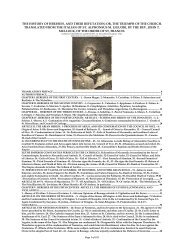The Writings of St. Francis of Assisi - + Saints' Works
The Writings of St. Francis of Assisi - + Saints' Works
The Writings of St. Francis of Assisi - + Saints' Works
Create successful ePaper yourself
Turn your PDF publications into a flip-book with our unique Google optimized e-Paper software.
THE WRITINGS OF ST. FRANCIS OF ASSISI<br />
very self, · and let all the other Ministers provincial also hold 502 him as (they would) me.<br />
<strong>The</strong> Testament made at Siena<br />
[TestSen]<br />
Sometime between April and May <strong>of</strong> 1226 A.D., while <strong>St</strong>. <strong>Francis</strong> visited the city <strong>of</strong> Siena, he fell so ill that<br />
all presumed he would shortly die. It was at that time that he dictated this short version <strong>of</strong> his last will and<br />
testament to Friar Benedict <strong>of</strong> Pirato. 503<br />
Write this way: I bless all my friars, who are in (our) religion 504 and who will come even<br />
until the end <strong>of</strong> the world (saeculum) . . . · Since on account <strong>of</strong> my weakness and the pain <strong>of</strong> my<br />
infirmity I cannot manage to speak, in these three words I am briefly making clear my will to my<br />
friars, · that is: that, in remembrance <strong>of</strong> my blessing and my testament, they love (dilectio) one<br />
another, · that they always love and observe our lady, Holy Poverty, · and that they be 505 faithful<br />
and subject to the prelates 506 and all the clerics <strong>of</strong> Holy Mother Church.<br />
On true and perfect gladness<br />
[VPLaet]<br />
This famous story, told in Chapter 8 <strong>of</strong> the Fioretti (the Little Flowers <strong>of</strong> <strong>St</strong>. <strong>Francis</strong>) with much<br />
embellishment, has its origin in a very simple and short version, which K. Esser considers to have<br />
originated with <strong>St</strong>. <strong>Francis</strong>. Though seemingly simplistic, the teaching presented here by <strong>St</strong>. <strong>Francis</strong> is <strong>of</strong><br />
the stature <strong>of</strong> <strong>St</strong>. John <strong>of</strong> the Cross' doctrine <strong>of</strong> the Nada. It is a pr<strong>of</strong>ound explanation <strong>of</strong> Christ's sayings:<br />
"Where your heart is, there your treasure will be." And "Do not rejoice in this, but rather that your names<br />
are written in Heaven." <strong>The</strong> time <strong>of</strong> composition is sometime after the beginning <strong>of</strong> 1220 A.D. 507<br />
<strong>The</strong> same (fr. Leonard) 508 recalled there that one day blessed <strong>Francis</strong>, while at <strong>St</strong>. Mary's<br />
(<strong>of</strong> the Angels), called friar Leo and said: "Friar Leo, write." · Who responded: "Behold I am<br />
ready." · "Write—he said—what is perfect gladness?" · A messenger comes and says that all the<br />
masters 509 <strong>of</strong> Paris have entered the Order, write, "not true gladness." · Likewise that all the<br />
502 lit. teneant, "to hold, keep, preserve, remember," etc.<br />
503 cf. K. Esser, pp. 600 and 599 respectively.<br />
504 see fn. 156.<br />
505 lit. exsistant, which means more exactly "to stand forth, arise, come into existence"; cf. Frag<br />
II, 10.<br />
506 see fn. 6.<br />
507 Friar Leo accompanied <strong>St</strong>. <strong>Francis</strong>' daily after his return from the Holy Land at the beginning<br />
<strong>of</strong> 1220 A.D., as his personal secretary and chaplain; cf. K. Esser, pp. 601-3.<br />
508 i.e. Friar Leo.<br />
509 i.e. pr<strong>of</strong>essors <strong>of</strong> theology.<br />
Page - 109













